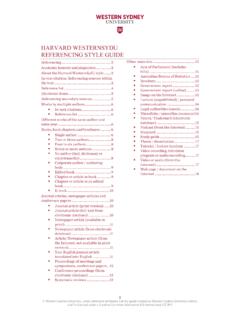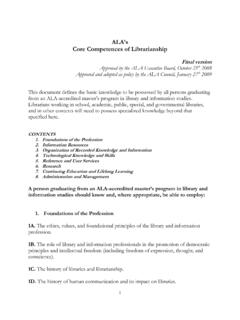Transcription of Charles Baudelaire, “The Painter of Modern Life” (1863 ...
1 Charles Baudelaire, The Painter of Modern life (1863). III. An Artist, Man Of The World, Man Of Crowds, And Child Today I want to talk to my readers about a singular man, whose originality is so powerful and clear-cut that it is self-sufficing, and does not bother to look for approval. None of his drawings is signed, if by signature we mean the few letters, which can be so easily forged, that compose a name, and that so many other artists grandly inscribe at the bottom of their most carefree sketches. But all his works are signed with his dazzling soul, and art-lovers who have seen and liked them will recognize them easily from the description I propose to give of them. M. C. G. loves mixing with the crowds loves being incognito, and carries his originality to the point of modesty. M. Thackeray, who, as is well known, is very interested in all things to do with art, and who draws the illustrations for his own novels, one day spoke of M. G. in a London review, much to the irritation of the latter who regarded the matter as an outrage to his modesty.
2 And again quite recently, when he heard that I was proposing to make an assessment of his mind and talent, he begged me, in a most peremptory manner, to suppress his name, and to discuss his works only as though they were the works of some anonymous person. I will humbly obey this odd request. The reader and I will proceed as though M. G. did not exist, and we will discuss his drawings and his watercolors, for which he professes a patrician's disdain, in the same way as would a group of scholars faced with the task of assessing the importance of a number of precious historical documents which chance has brought to light, and the author of which must for ever remain unknown. And even to reassure my conscience completely, let my readers assume that all the things I have to say about the artist's nature, so strangely and mysteriously dazzling, have been more or less accurately suggested by the works in question; pure poetic hypothesis, conjecture, or imaginative reconstructions.
3 M. G. is an old man. Jean-Jacques began writing, so they say, at the age of forty-two. Perhaps it was at about that age that M. G., obsessed by the world of images that filled his mind, plucked up courage to cast ink and colors on to a sheet of white paper. To be honest, he drew like a barbarian, like a child, angrily chiding his clumsy fingers and his disobedient tool. I have seen a large number of these early scribblings, and I admit that most of the people who know what they are talking about, or who claim to, could, without shame, have failed to discern the latent genius -1- that dwelt in these obscure beginnings. Today, M. G., who has discovered unaided all the little tricks of the trade, and who has taught himself, without help or advice, has become a powerful master in his own way; of his early artlessness he has retained only what was needed to add an unexpected spice to his abundant gift. When he happens upon one of these efforts of his early manner, he tears it up or burns it, with a most amusing show of shame and indignation.
4 For ten whole years I wanted to make the acquaintance of M. G., who is by nature a great traveler and very cosmopolitan. I knew that he had for a long time been working for an English illustrated paper and that in it had appeared engravings from his travel sketches (Spain, Turkey, the Crimea). Since then I have seen a considerable mass of these on-the-spot drawings from life , and I have thus been able to read' a detailed and daily account, infinitely preferable to any other, of the Crimean campaign. The same paper had also published (without signature, as before) a large quantity of compositions by this artist from the new ballets and operas. When at last I ran him to ground I saw at once that I was not dealing exactly with an artist but rather with a man of the world. In this context, pray interpret the word artist' in a very narrow sense, and the expression man of the world' in a very broad one. By man of the world', I mean a man of the whole world, a man who understands the world and the mysterious and legitimate reasons behind all its customs; by artist', I mean a specialist, a man tied to his palette like a serf to the soil.
5 M. G. does not like being called an artist. Is he not justified to a small extent? He takes an interest in everything the world over, he wants to know, understand, and assess everything that happens on the surface of our spheroid. The artist moves little, or even not at all, in intellectual and political circles. If he lives in the Breda quarter he knows nothing of what goes on in the Faubourg Saint- Germain. With two or three exceptions, which it is unnecessary to name, the majority of artists are, let us face it, very skilled brutes, mere manual laborers, village pub-talkers with the minds of country bumpkins. Their talk; inevitably enclosed within very narrow limits, quickly becomes a bore to the man of the world, to the spiritual citizen of the universe. Thus to begin to understand M. G., the first thing to note is that curiosity may be considered the starting point of his genius. Do you remember a picture (for indeed it is a picture!) written by the most powerful pen of this age and entitled The Man of the Crowd?
6 Sitting in a cafe, and looking through the shop window, a convalescent is enjoying the sight of the passing crowd, and identifying himself in thought with all the thoughts that are moving around him. He has only recently come back from the shades of -2- death and breathes in with delight all the spores and odors of life ; as he has been on the point of forgetting everything, he remembers and passionately wants to remember everything. In the end he rushes out into the crowd in search of a man unknown to him whose face, which he had caught sight of, had in a flash fascinated him. Curiosity had become a compelling, irresistible passion. Now imagine an artist perpetually in the spiritual condition of the convalescent, and you will have the key to the character of M. G. But convalescence is like a return to childhood. The convalescent, like the child, enjoys to the highest degree the faculty of taking a lively interest in things, even the most trivial in appearance.
7 Let us hark back, if we can, by a retrospective effort of our imaginations, to our youngest, our morning impressions, and we shall recognize that they were remarkably akin to the vividly colored impressions that we received later on after a physical illness, provided that illness left our spiritual faculties pure and unimpaired. The child sees everything as a novelty; the child is always drunk'. Nothing is more like what we call inspiration than the joy the child feels in drinking in shape and color. I will venture to go even further and declare that inspiration has some connection with congestion, that every sublime thought is accompanied by a more or less vigorous nervous impulse that reverberates in the cerebral cortex. The man of genius has strong nerves; those of the child are weak. In the one, reason has assumed an important role; in the other, sensibility occupies almost the whole being. But genius is no more than childhood recaptured at will, childhood equipped now with man's physical means to express itself, and with the analytical mind that enables it to bring order into the sum of experience, involuntarily amassed.
8 To this deep and joyful curiosity must be attributed that stare, animal-like in its ecstasy, which all children have when confronted with something new, whatever it may be, face or landscape, light, gilding, colors, watered silk, enchantment of beauty, enhanced by the arts of dress. A friend of mine was telling me one day how, as a small boy, he used to be present when his father was dressing, and how he had always been filled with astonishment, mixed with delight, as he looked at the arm muscle, the color tones of the skin tinged with rose and yellow, and the bluish network of the veins. The picture of the external world was already beginning to fill him with respect, and to take possession of his brain. Already the shape of things obsessed and possessed him. A precocious fate was showing the tip of its nose. His damnation was settled. Need I say that, today, the child is a famous Painter . -3- I was asking you just now to think of M. G. as an eternal convalescent; to complete your idea of him, think of him also as a man-child, as a man possessing at every moment the genius of childhood, in other words a genius for whom no edge of life is blunted.
9 I told you that I was unwilling to call him a pure artist, and that he himself rejected this title, with a modesty tinged with aristocratic restraint. I would willingly call him a dandy, and for that I. would have a sheaf of good reasons; for the word dandy' implies a quintessence of character and a subtle under-standing of all the moral mechanisms of this world; but, from another aspect, the dandy aspires to cold detachment, and it is in this way that M. G, who is dominated, if ever anyone was, by an insatiable passion, that of seeing and feeling, parts company trenchantly with dandyism. Anabam amare, said St Augustine. I love passion, passionately,' M. G. might willingly echo. The dandy is blas , or affects to be, as a matter of policy and class attitude. M. G. hates blas people. Sophisticated minds will understand me when I say that he possesses that difficult art of being sincere without being ridiculous. I would confer on him the title of philosopher, to which he has a right for more than one reason; but his excessive love of visible, tangible things, in their most plastic form, inspires him with a certain dislike of those things that go to make up the intangible kingdom of the metaphysical.
10 Let us therefore reduce him to the status of the pure pictorial moralist, like La Bruyere. The crowd is his domain, just as the air is the bird's, and water that of the fish. His passion and his profession is to merge with the crowd. For the perfect idler, for the passionate ob-server it becomes an immense source of enjoyment to establish his dwelling in the throng, in the ebb and flow, the bustle, the fleeting and the infinite. To be away from home and yet to feel at home anywhere; to see the world, to be at the very centre of the world, and yet to be unseen of the world, such are some of the minor pleasures of those independent, intense and impartial spirits, who do not lend themselves easily to linguistic definitions. The observer is a prince enjoying his incognito wherever he goes. The lover of life makes the whole world into his family, just as the lover of the fair sex creates his from all the lovely women he has found, from those that could be found, and those who arc impossible to find, just as the picture-lover lives in an enchanted world of dreams painted on canvas.












